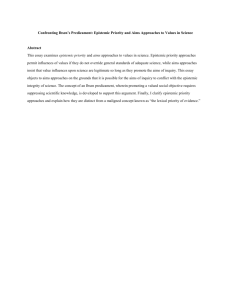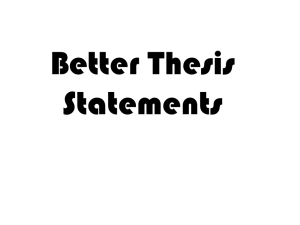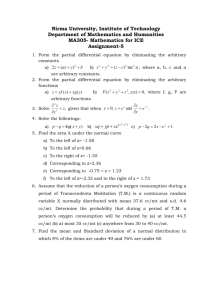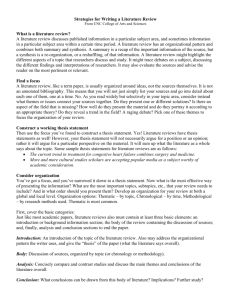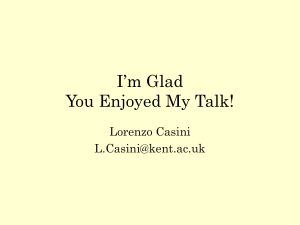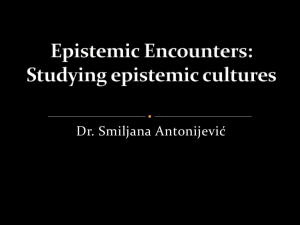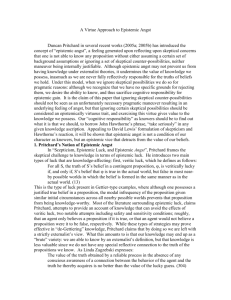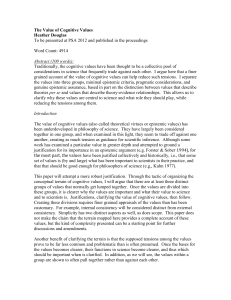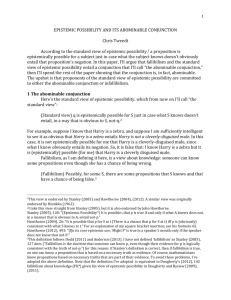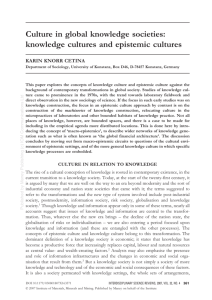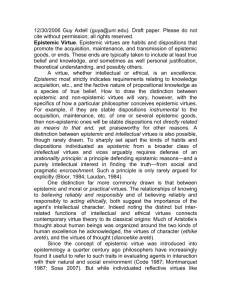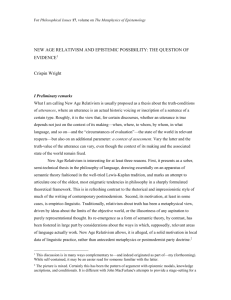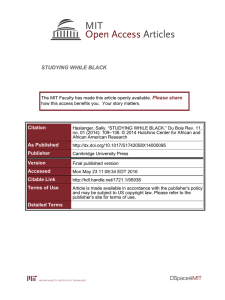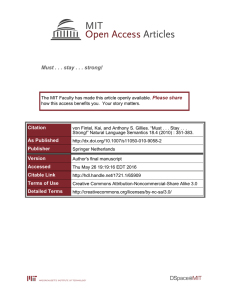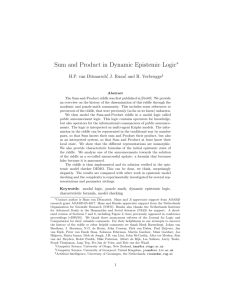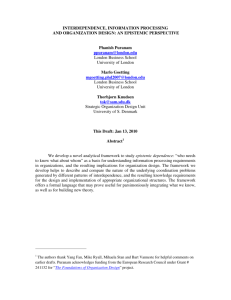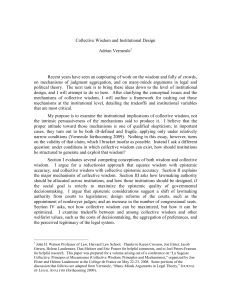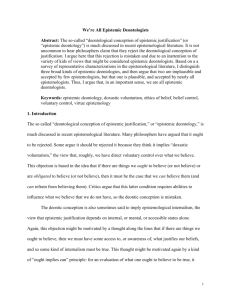ResearchStatement
advertisement
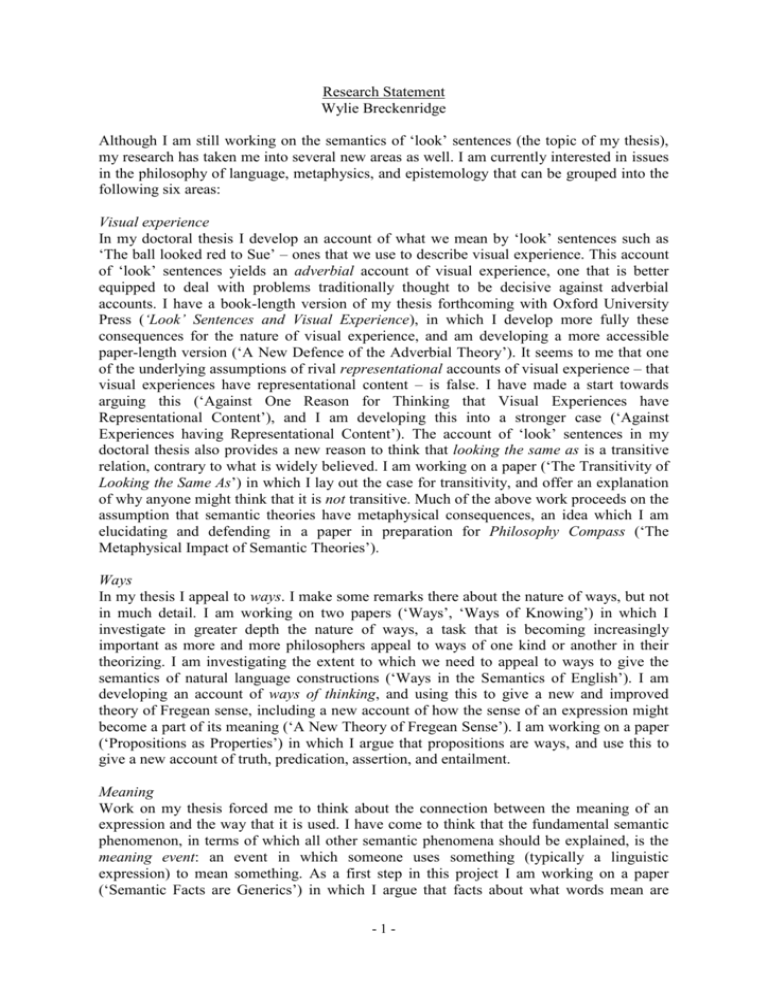
Research Statement Wylie Breckenridge Although I am still working on the semantics of ‘look’ sentences (the topic of my thesis), my research has taken me into several new areas as well. I am currently interested in issues in the philosophy of language, metaphysics, and epistemology that can be grouped into the following six areas: Visual experience In my doctoral thesis I develop an account of what we mean by ‘look’ sentences such as ‘The ball looked red to Sue’ – ones that we use to describe visual experience. This account of ‘look’ sentences yields an adverbial account of visual experience, one that is better equipped to deal with problems traditionally thought to be decisive against adverbial accounts. I have a book-length version of my thesis forthcoming with Oxford University Press (‘Look’ Sentences and Visual Experience), in which I develop more fully these consequences for the nature of visual experience, and am developing a more accessible paper-length version (‘A New Defence of the Adverbial Theory’). It seems to me that one of the underlying assumptions of rival representational accounts of visual experience – that visual experiences have representational content – is false. I have made a start towards arguing this (‘Against One Reason for Thinking that Visual Experiences have Representational Content’), and I am developing this into a stronger case (‘Against Experiences having Representational Content’). The account of ‘look’ sentences in my doctoral thesis also provides a new reason to think that looking the same as is a transitive relation, contrary to what is widely believed. I am working on a paper (‘The Transitivity of Looking the Same As’) in which I lay out the case for transitivity, and offer an explanation of why anyone might think that it is not transitive. Much of the above work proceeds on the assumption that semantic theories have metaphysical consequences, an idea which I am elucidating and defending in a paper in preparation for Philosophy Compass (‘The Metaphysical Impact of Semantic Theories’). Ways In my thesis I appeal to ways. I make some remarks there about the nature of ways, but not in much detail. I am working on two papers (‘Ways’, ‘Ways of Knowing’) in which I investigate in greater depth the nature of ways, a task that is becoming increasingly important as more and more philosophers appeal to ways of one kind or another in their theorizing. I am investigating the extent to which we need to appeal to ways to give the semantics of natural language constructions (‘Ways in the Semantics of English’). I am developing an account of ways of thinking, and using this to give a new and improved theory of Fregean sense, including a new account of how the sense of an expression might become a part of its meaning (‘A New Theory of Fregean Sense’). I am working on a paper (‘Propositions as Properties’) in which I argue that propositions are ways, and use this to give a new account of truth, predication, assertion, and entailment. Meaning Work on my thesis forced me to think about the connection between the meaning of an expression and the way that it is used. I have come to think that the fundamental semantic phenomenon, in terms of which all other semantic phenomena should be explained, is the meaning event: an event in which someone uses something (typically a linguistic expression) to mean something. As a first step in this project I am working on a paper (‘Semantic Facts are Generics’) in which I argue that facts about what words mean are -1- generic facts about meaning events: the fact that w means m is the generic fact that w is used to mean m. I show how this can account for how words acquire and change meaning, for why there are normative facts about word use, and for why there is a connection between meaning and use. The next stage in the project is to extend this idea to complex expressions (which can, I will argue, be done). Related to this, I am developing some new ideas about the nature of word conversion and lexical categories (‘Word Conversion and Lexical Categories’). Generics In much of my work I make claims that are to be understood generically, as we naturally understand the claim that cats are good pets. My account of word meaning, for example, is that for w to mean m is for w to be used to mean m, where the claim that w is used to mean m is to be understood generically. Although I am under no obligation to give an account of the nature of generic claims, it is nevertheless something in which I have become increasingly interested. I am working on a new account of generics (‘On Generic Uses of Sentences’), according to which generic claims are ones in which two properties are said to stand in a certain non-extensional relation. Epistemic modals I have become interested in the way that we use epistemic modals such as ‘might’ and ‘must’. I am working on a survey article to appear in Philosophy Compass (‘Epistemic Modals’), and a second paper (‘A New Theory of Epistemic Modals’) in which I develop a new and slightly radical approach, according to which we use epistemic ‘might’ to express disjunctions, and thus on which this use of ‘might’ is perhaps neither epistemic nor modal. Related to this, I am exploring a new account of predicates of personal taste, according to which our claims about how things taste are generic claims about tasting events. Arbitrary reference (With Ofra Magidor). We are developing the idea that we can refer arbitrarily: when I say, “Let John be an arbitrary Frenchman”, I succeed in fixing the reference of ‘John’ to some arbitrary Frenchman. But I do not know and cannot know which Frenchman that is. In one paper (‘Arbitrary Reference and Instantial Reasoning’) we argue that we can and do refer arbitrarily in this way, and propose a new account of the so-called instantial reasoning employed in many mathematical proofs. In a second paper (‘Arbitrary Reference and Vagueness’) we appeal to arbitrary reference to give a new epistemic account of vagueness, one that differs from Williamson’s in several key respects. I am also investigating whether or not arbitrary reference is involved in other well-known phenomena in the philosophy of language, such as donkey anaphora and the distinction between particular and nonparticular readings. I am also working on various miscellaneous papers. In ‘Making’ I develop an account of what it is to make an object, and use it to defend the position that a statue that coincides with a piece of alloy is identical to that piece of alloy. In ‘Frege’s Puzzle’ I argue against one standard way of showing that the meaning of a name cannot be the object to which it refers. In ‘Against Saying what we Believe’ I argue that we should stop the widespread practice of saying whether or not we believe the positions for which we are arguing are true – rather, we should just give the arguments. -2-

